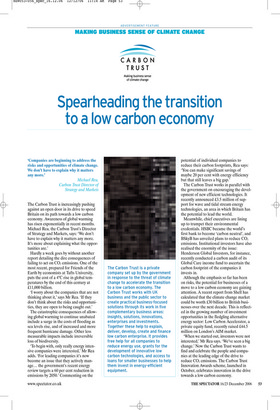Spearheading the transition to a low carbon economy
‘Companies are beginning to address the risks and opportunities of climate change. We don’t have to explain why it matters any more.’ Michael Rea, Carbon Trust Director of Strategy and Markets
The Carbon Trust is increasingly pushing against an open door in its drive to speed Britain on its path towards a low carbon economy. Awareness of global warming has risen exponentially in recent months. Michael Rea, the Carbon Trust’s Director of Strategy and Markets, says: ‘We don’t have to explain why it matters any more. It’s more about explaining what the opportunities are.’ Hardly a week goes by without another report detailing the dire consequences of failing to act on CO2 emissions. One of the most recent, prepared for Friends of the Earth by economists at Tufts University, puts the cost of a 4°C rise in global temperatures by the end of this century at £11,000 billion.
‘I worry about the companies that are not thinking about it,’ says Mr Rea. ‘If they don’t think about the risks and opportunities, they are open to being caught out.’ The catastrophic consequences of allowing global warming to continue unabated include a surge in the costs of flooding as sea levels rise, and of increased and more frequent hurricane damage. Other less measurable impacts include irreversible loss of biodiversity.
‘To begin with, only really energy intensive companies were interested,’ Mr Rea adds. ‘For leading companies it’s now become an issue that they actively manage... the government’s recent energy review targets a 60 per cent reduction in emissions by 2050.’ Commenting on the potential of individual companies to reduce their carbon footprints, Rea says: ‘You can make significant savings of maybe 20 per cent with energy efficiency but that still leaves a big gap.’ The Carbon Trust works in parallel with the government on encouraging the development of new efficient technologies. It recently announced £3.5 million of support for wave and tidal stream energy technologies, an area in which Britain has the potential to lead the world.
Meanwhile, chief executives are lining up to trumpet their environmental credentials. HSBC became the world’s first bank to become ‘carbon neutral’, and BSkyB has unveiled plans to reduce CO2 emissions. Institutional investors have also realised the enormity of the issue: Henderson Global Investors, for instance, recently conducted a carbon audit of its Global Care income fund to ascertain the carbon footprint of the companies it invests in.
Although the emphasis so far has been on risks, the potential for businesses of a move to a low carbon economy are gaining attention. A recent report from Shell has calculated that the climate change market could be worth £30 billion to British businesses over the next decade. This is reflected in the growing number of investment opportunities in the fledgling alternative energy sector: Low Carbon Accelerator, a private equity fund, recently raised £44.5 million on London’s AIM market.
‘When we started out, investors were not interested,’ Mr Rea says. ‘We’ve seen a big change.’ Now the Carbon Trust wants to find and celebrate the people and companies at the leading edge of the drive to reduce CO2 emissions. The Carbon Trust Innovation Awards scheme, launched in October, celebrates innovation in the drive towards a low carbon economy.






































































































































 Previous page
Previous page